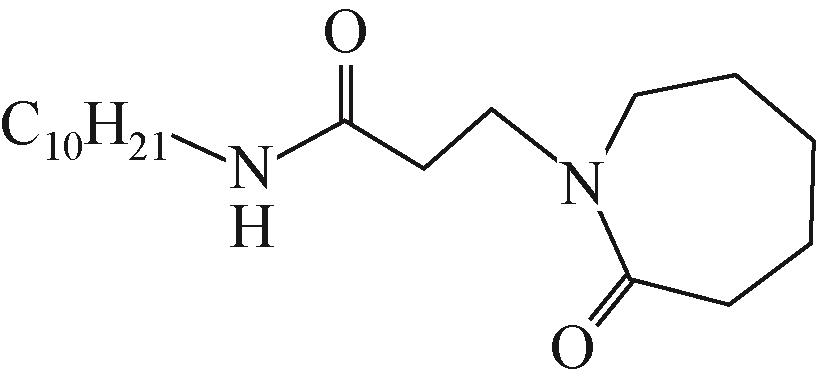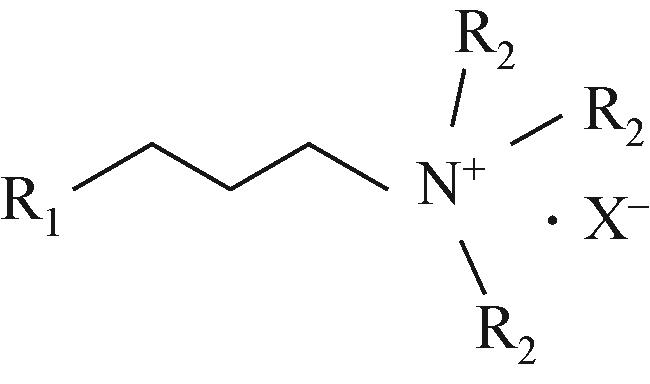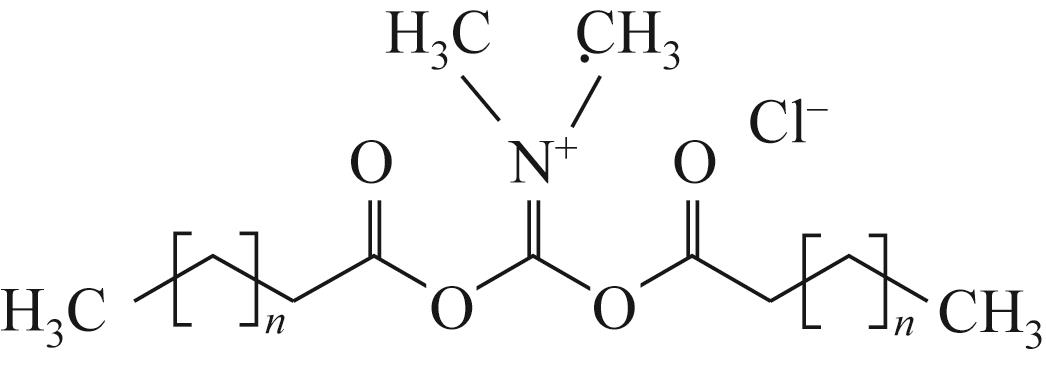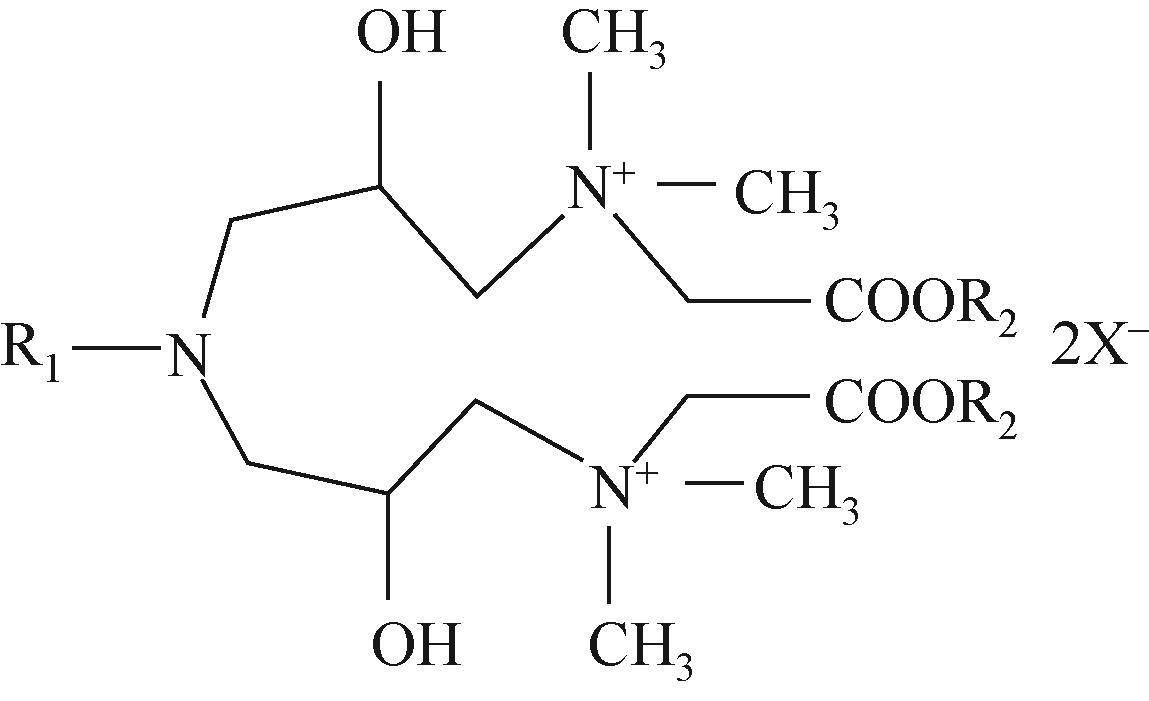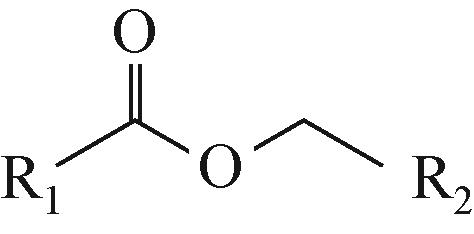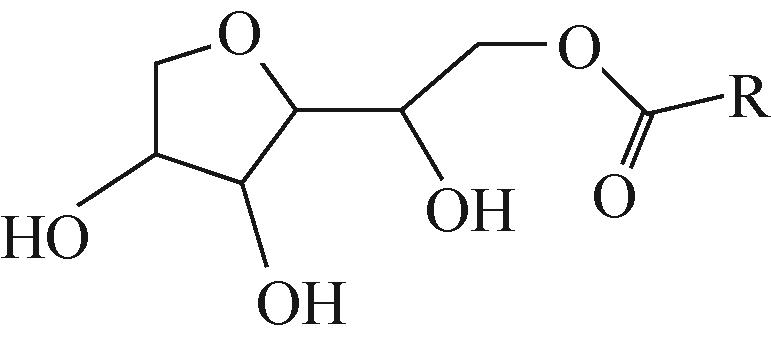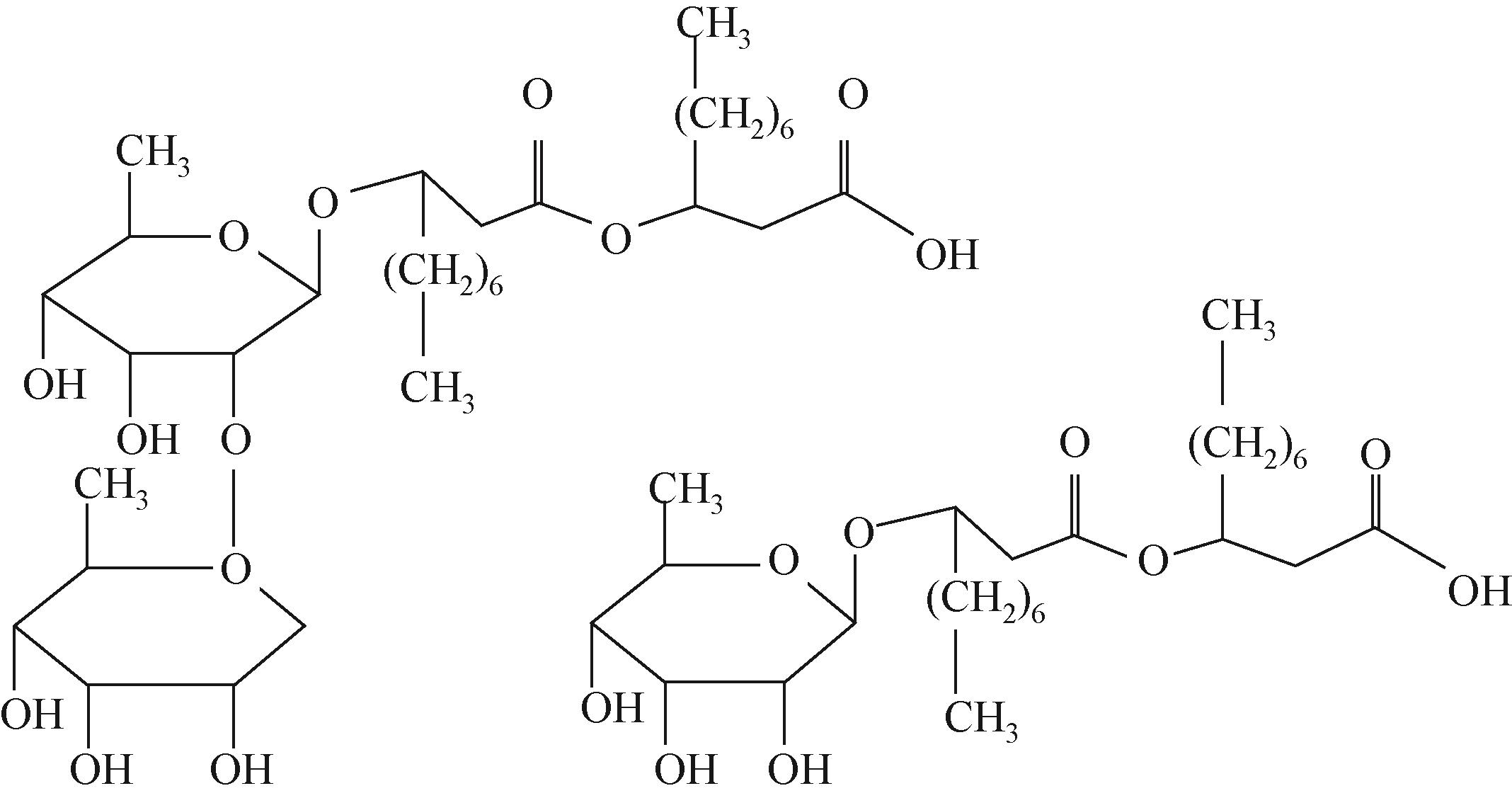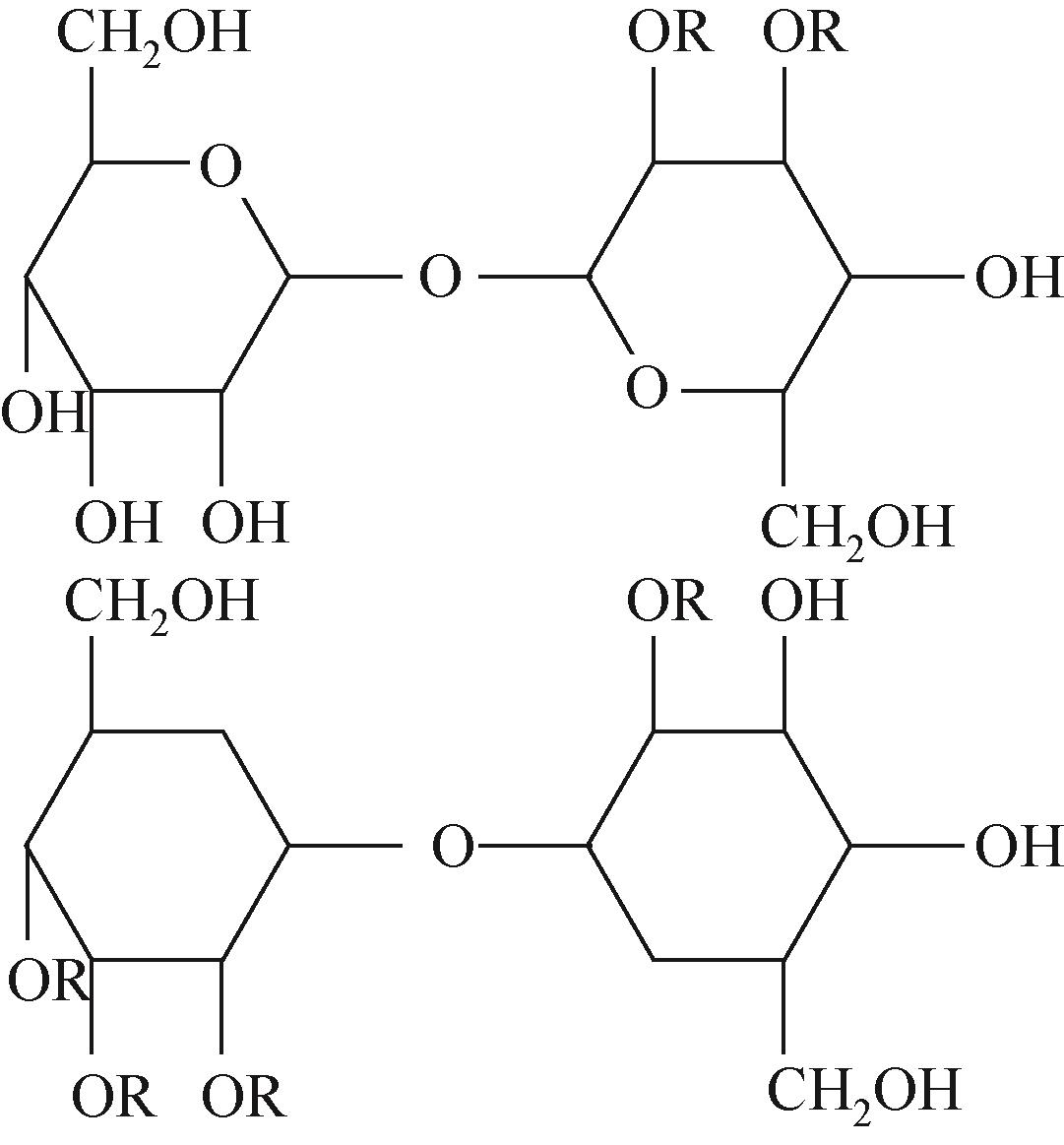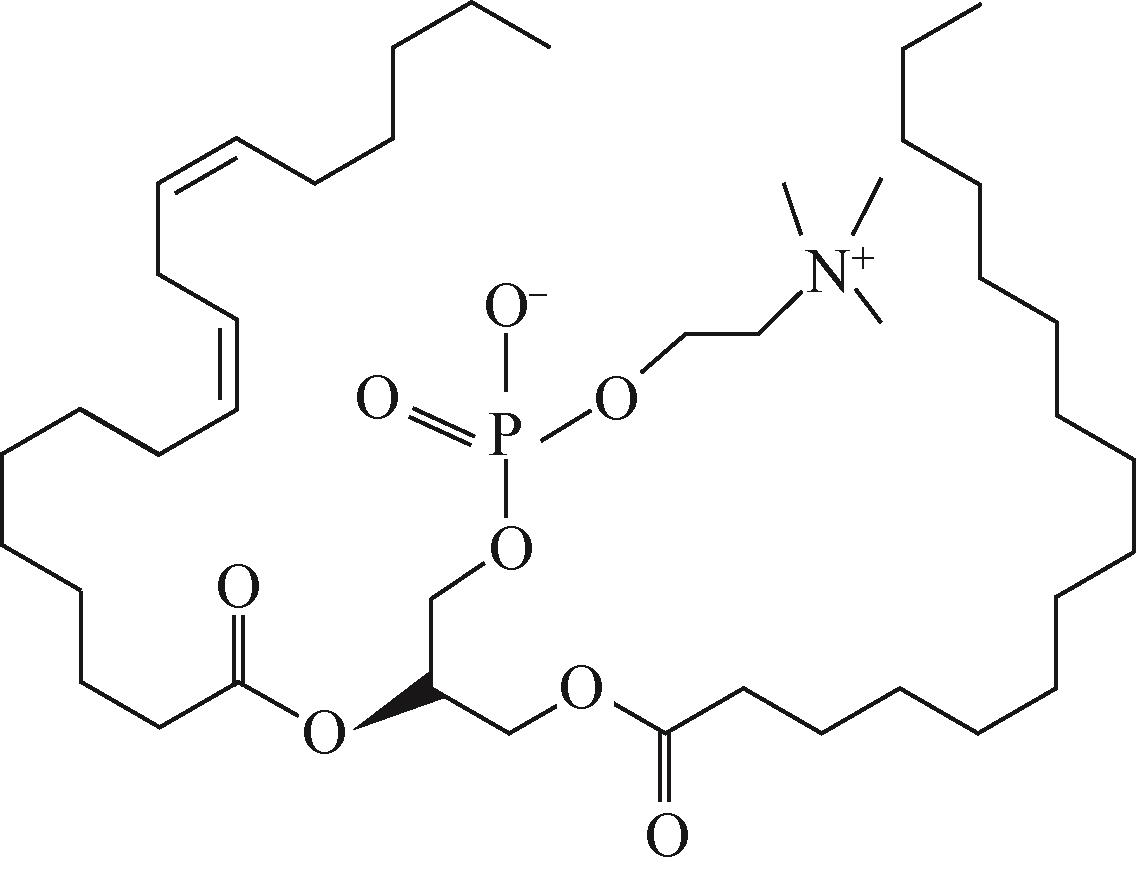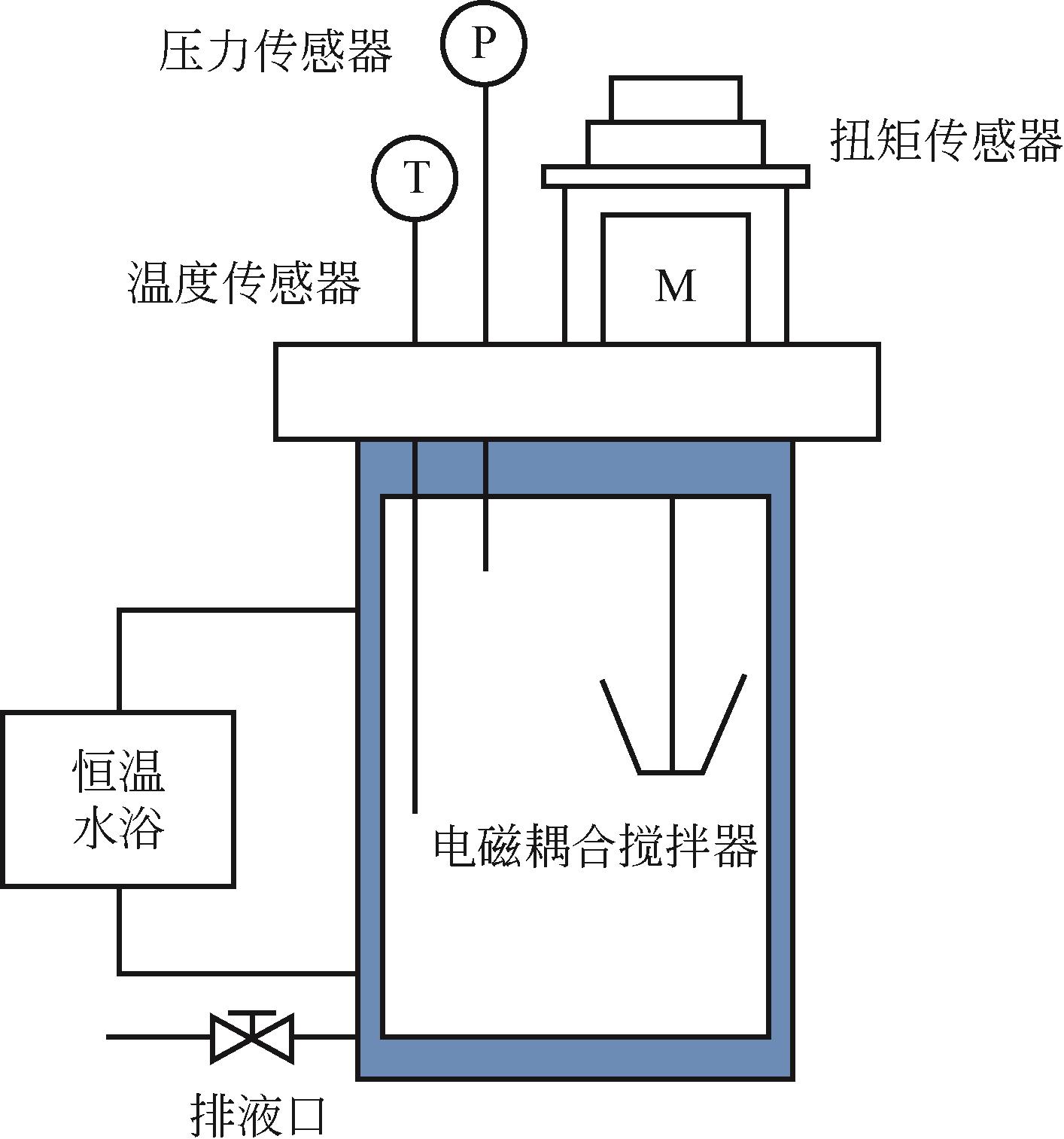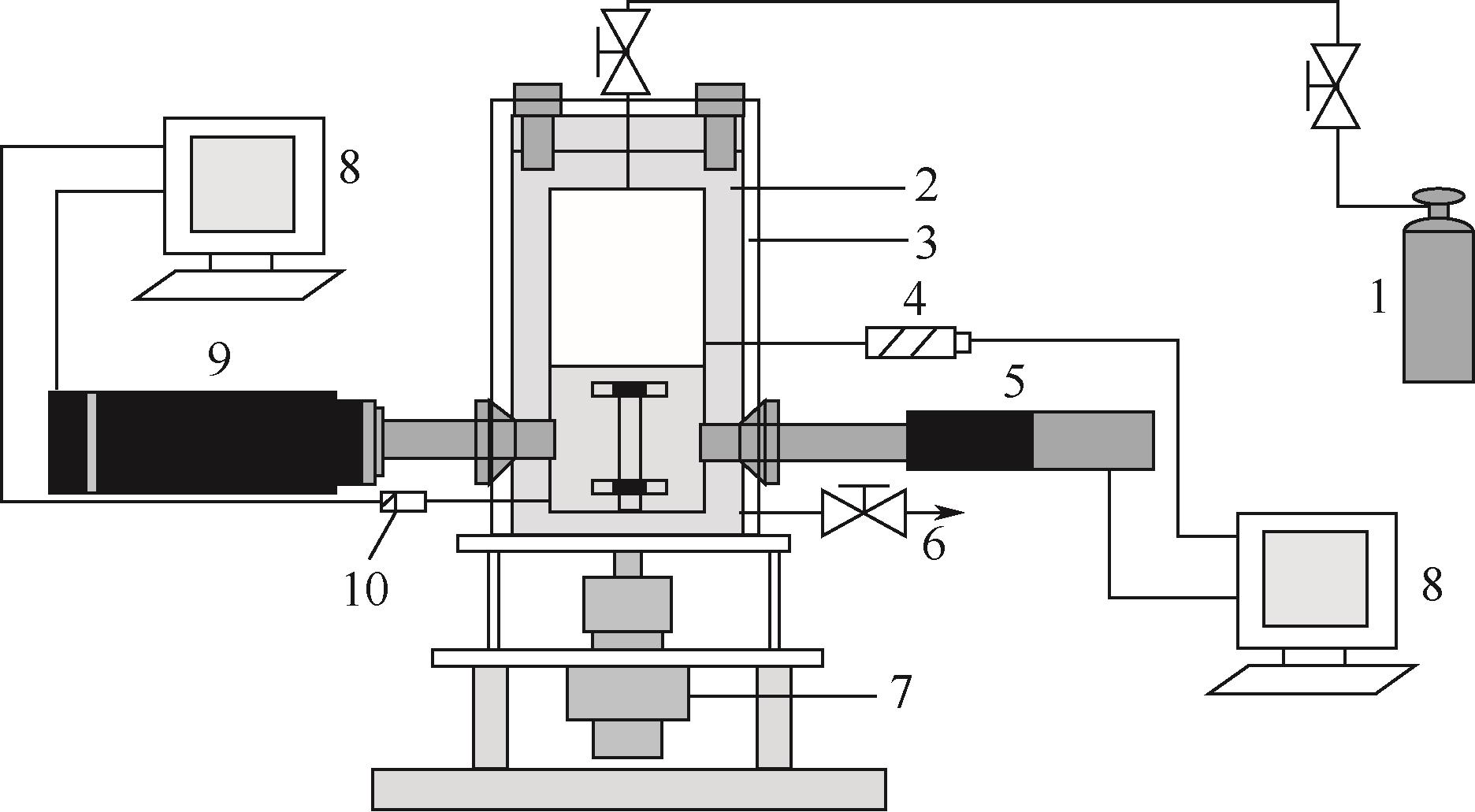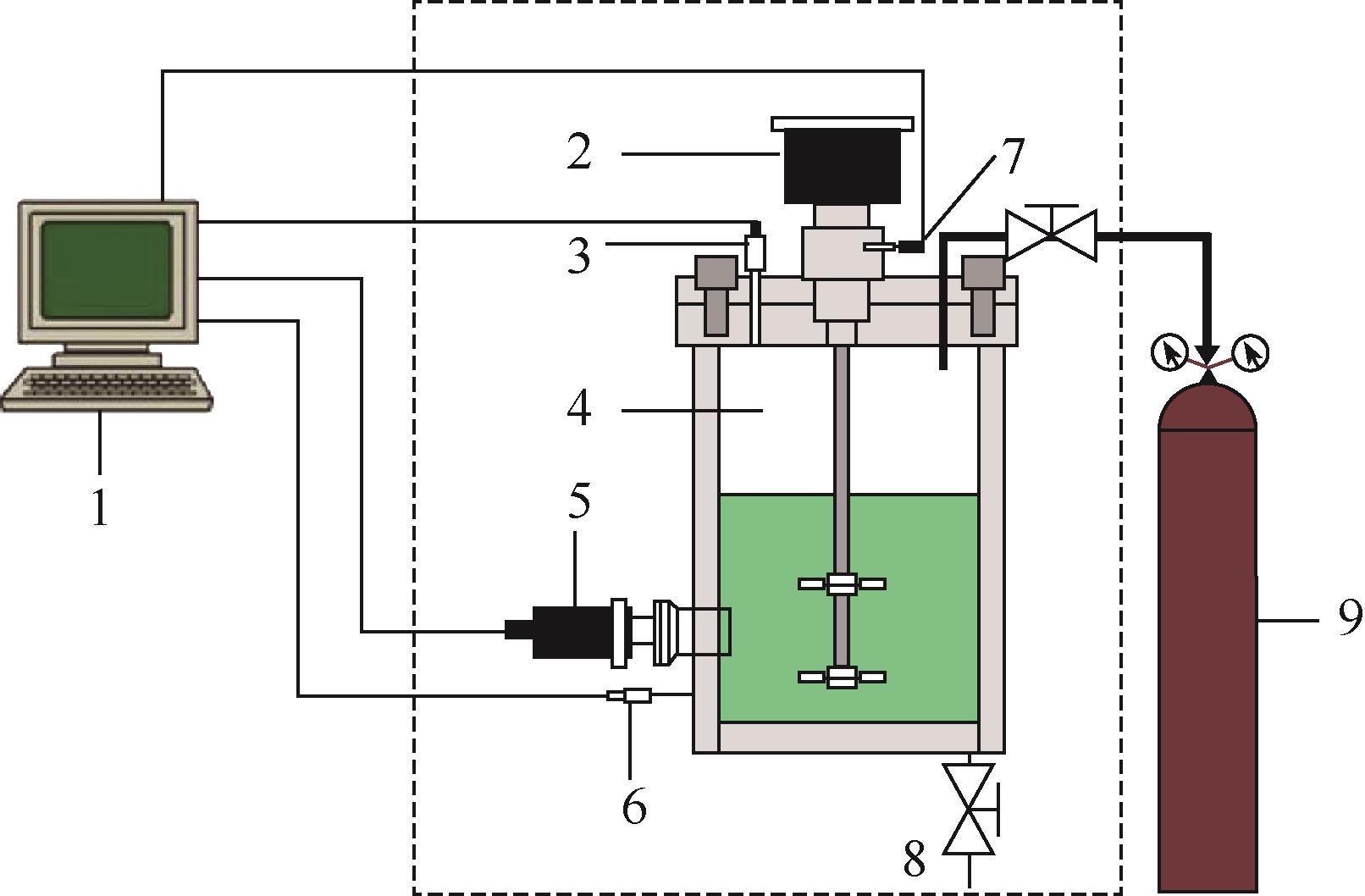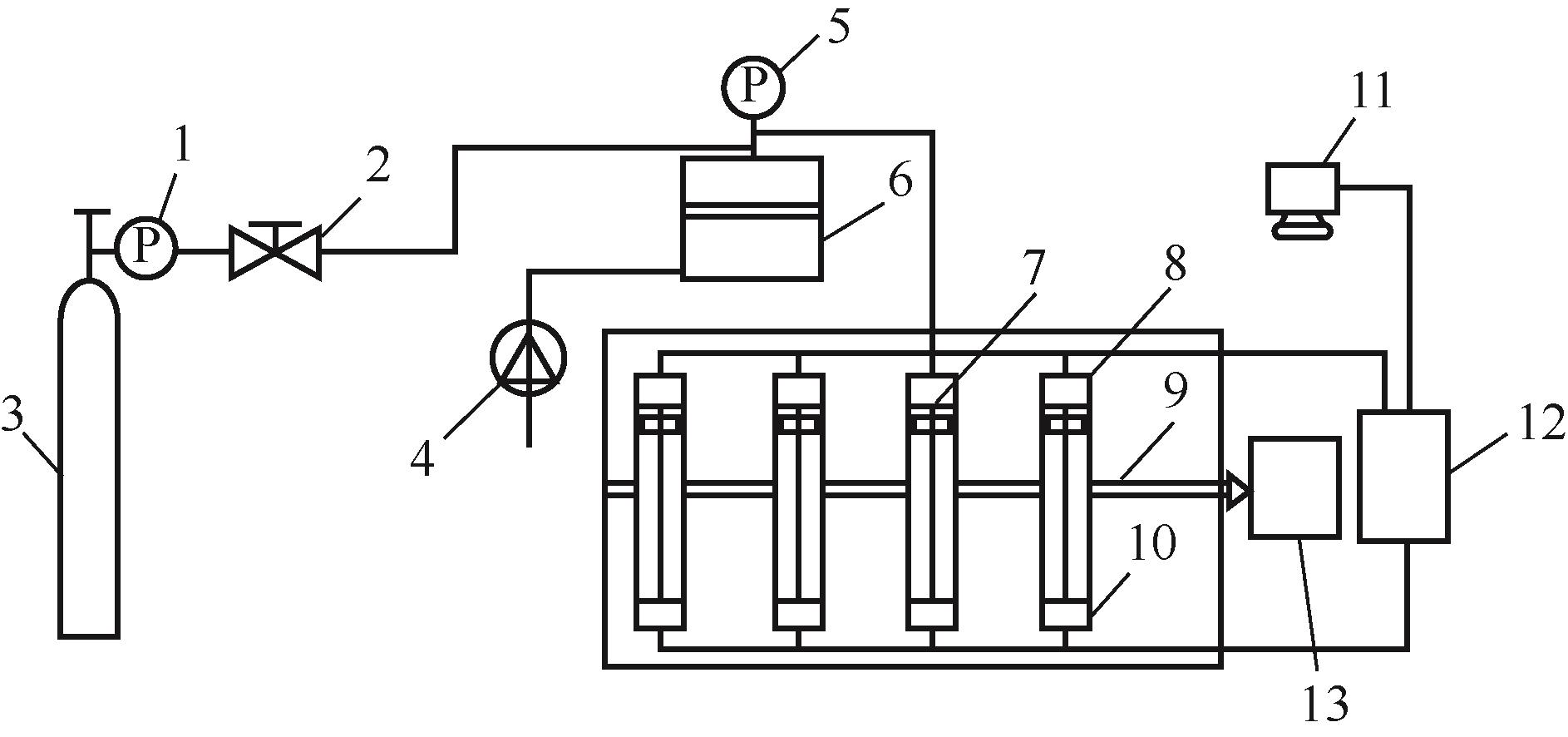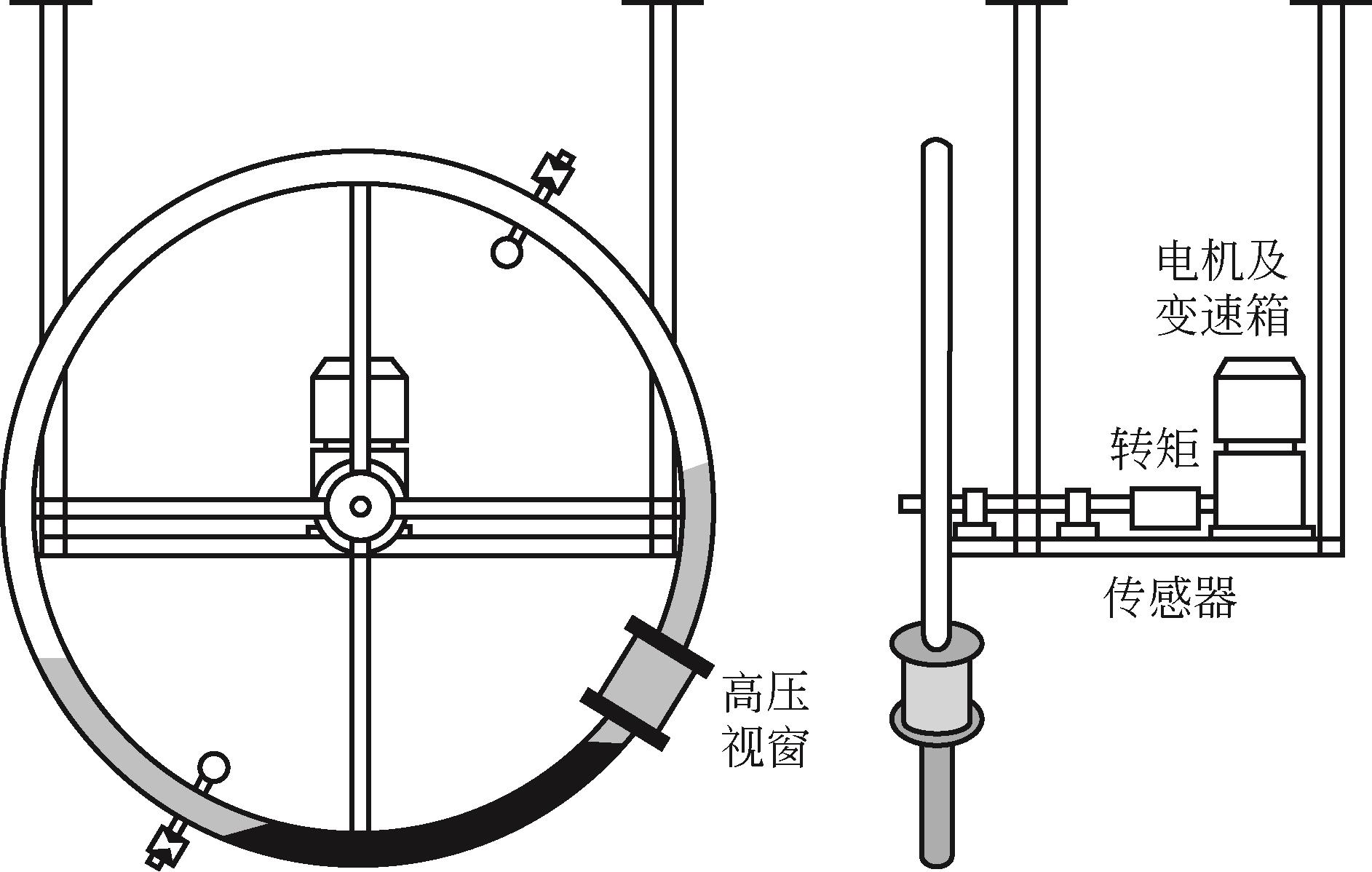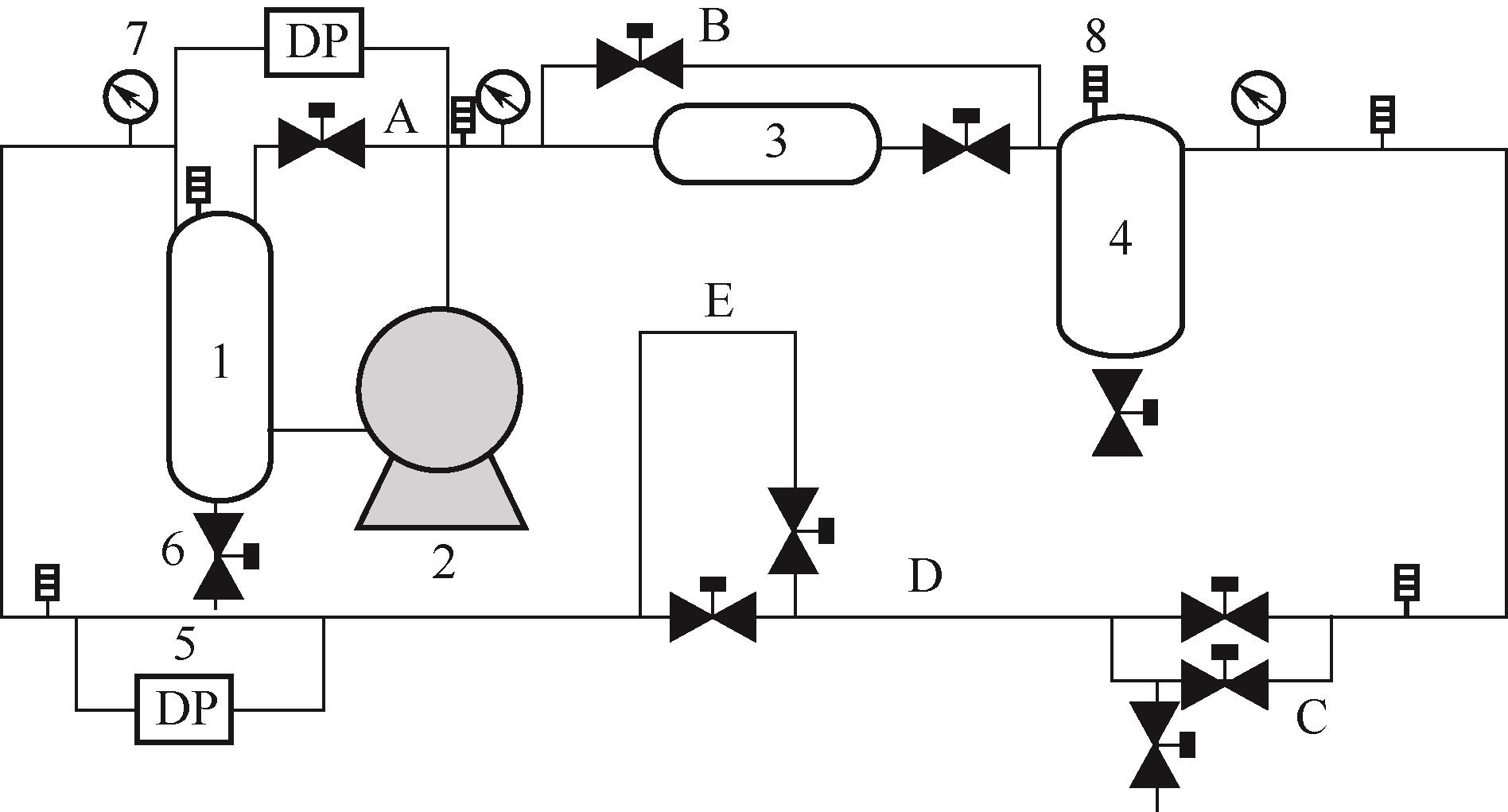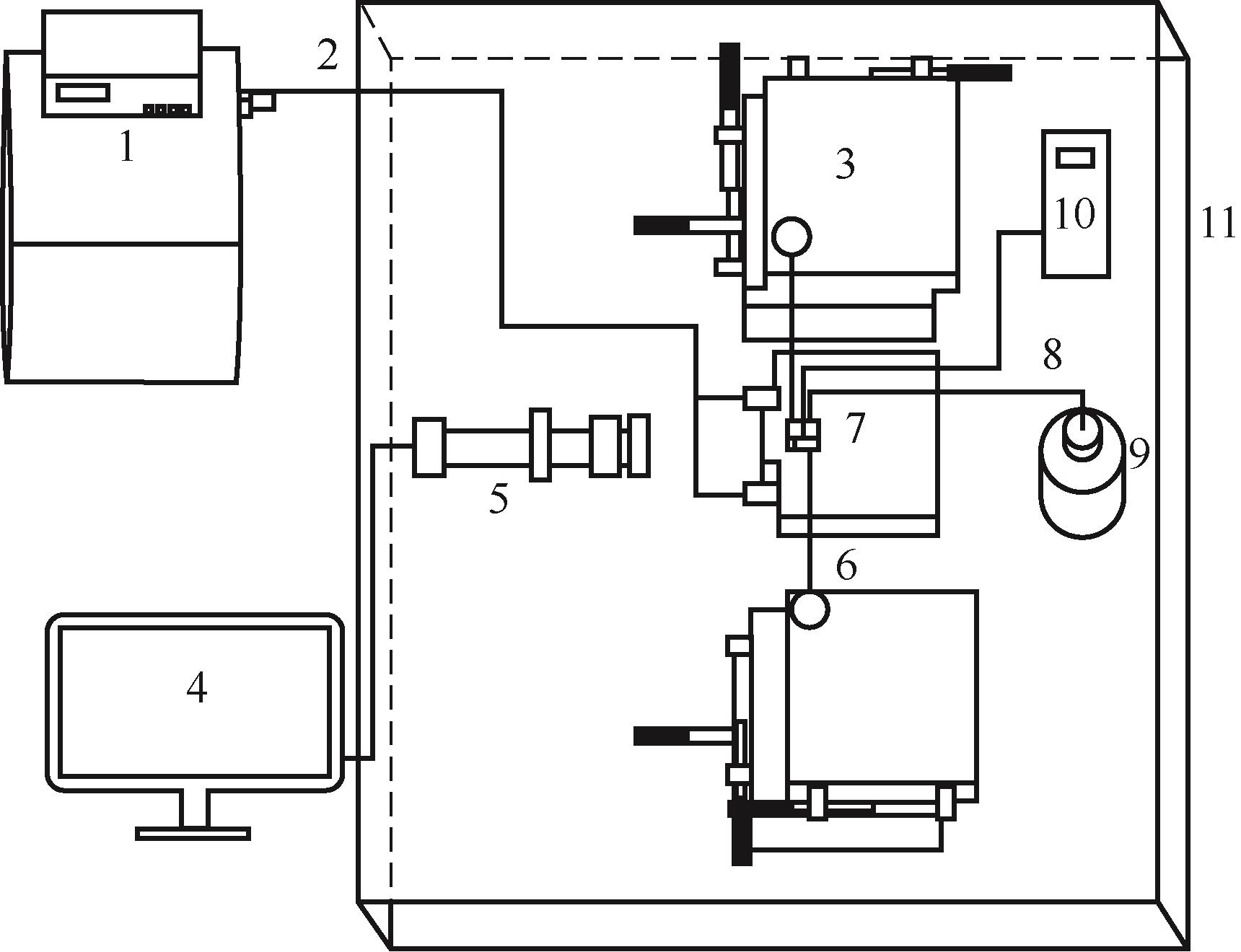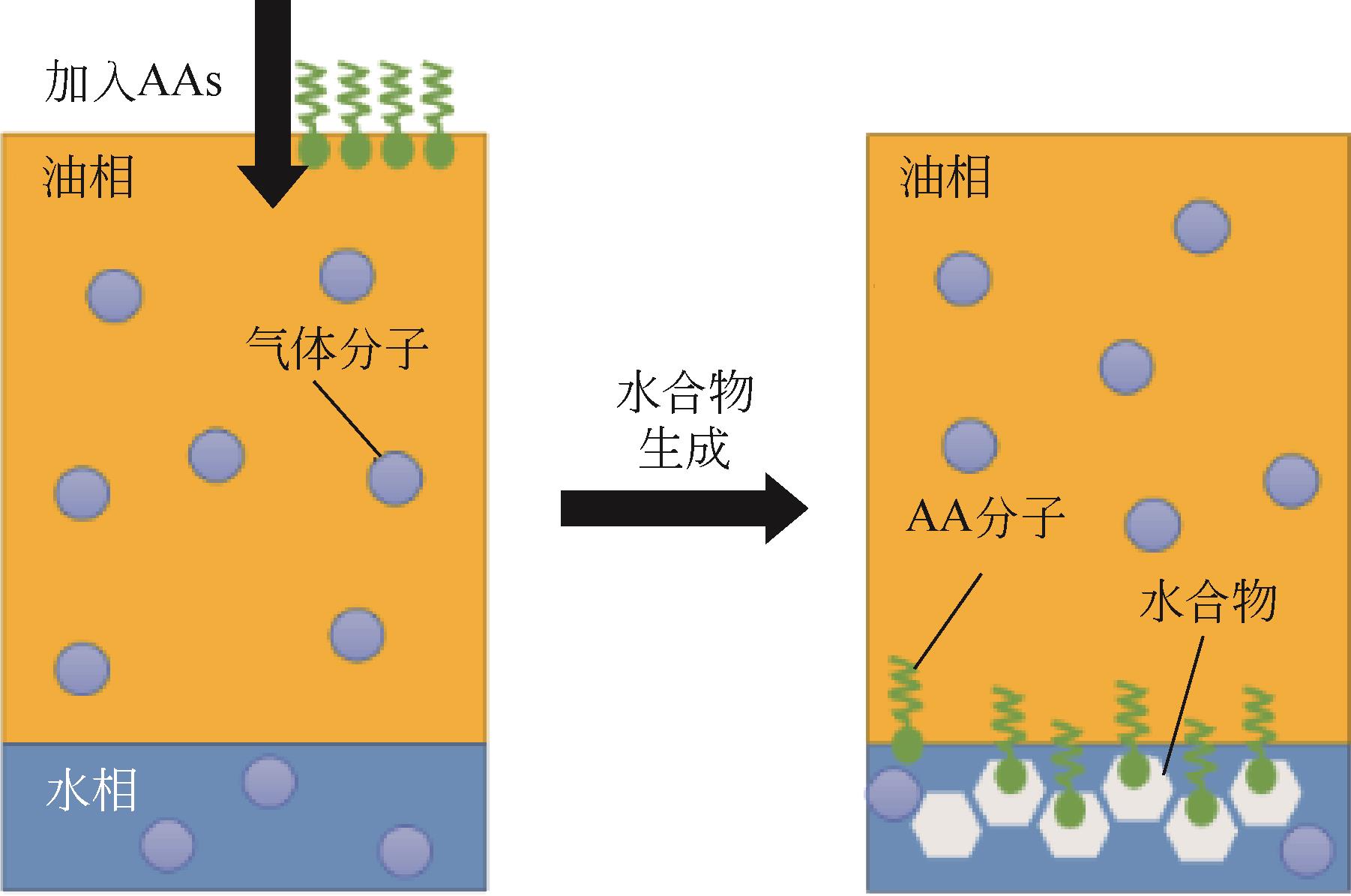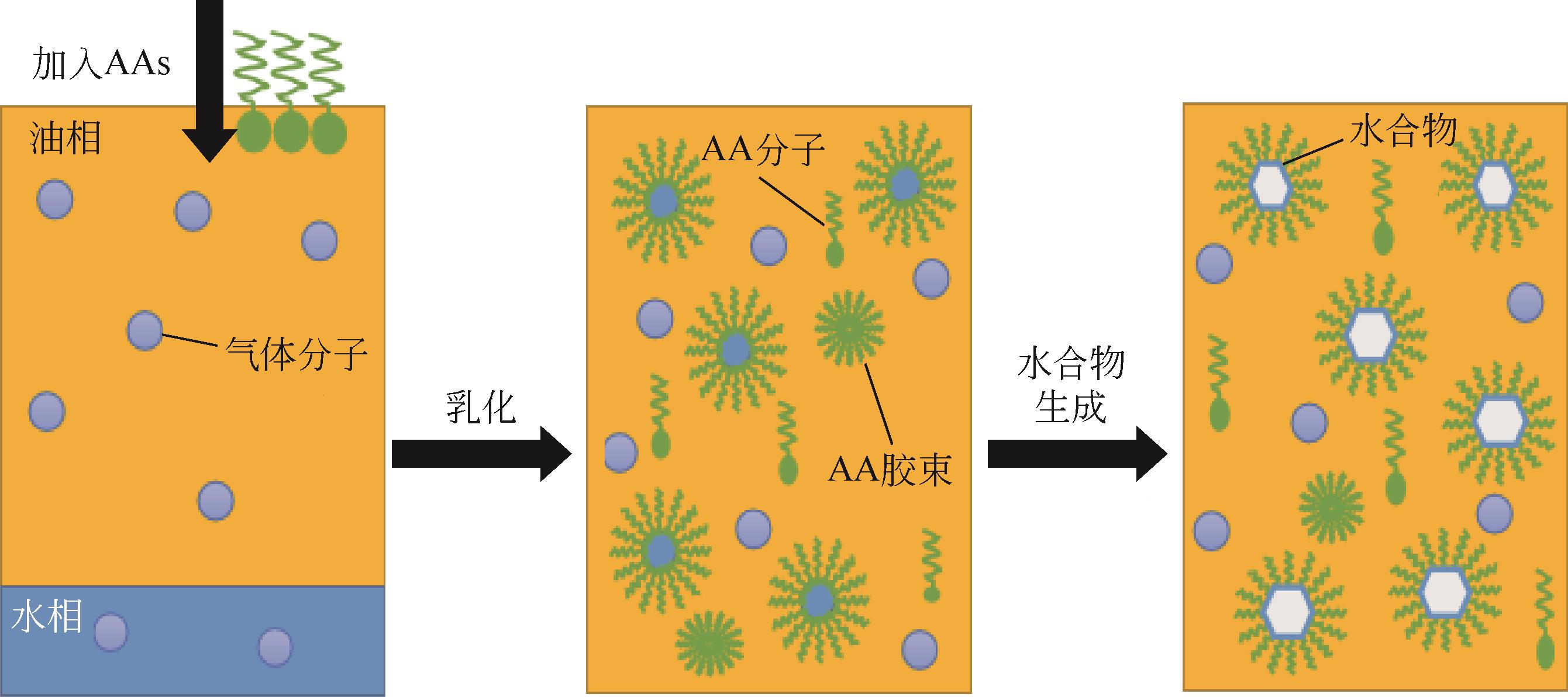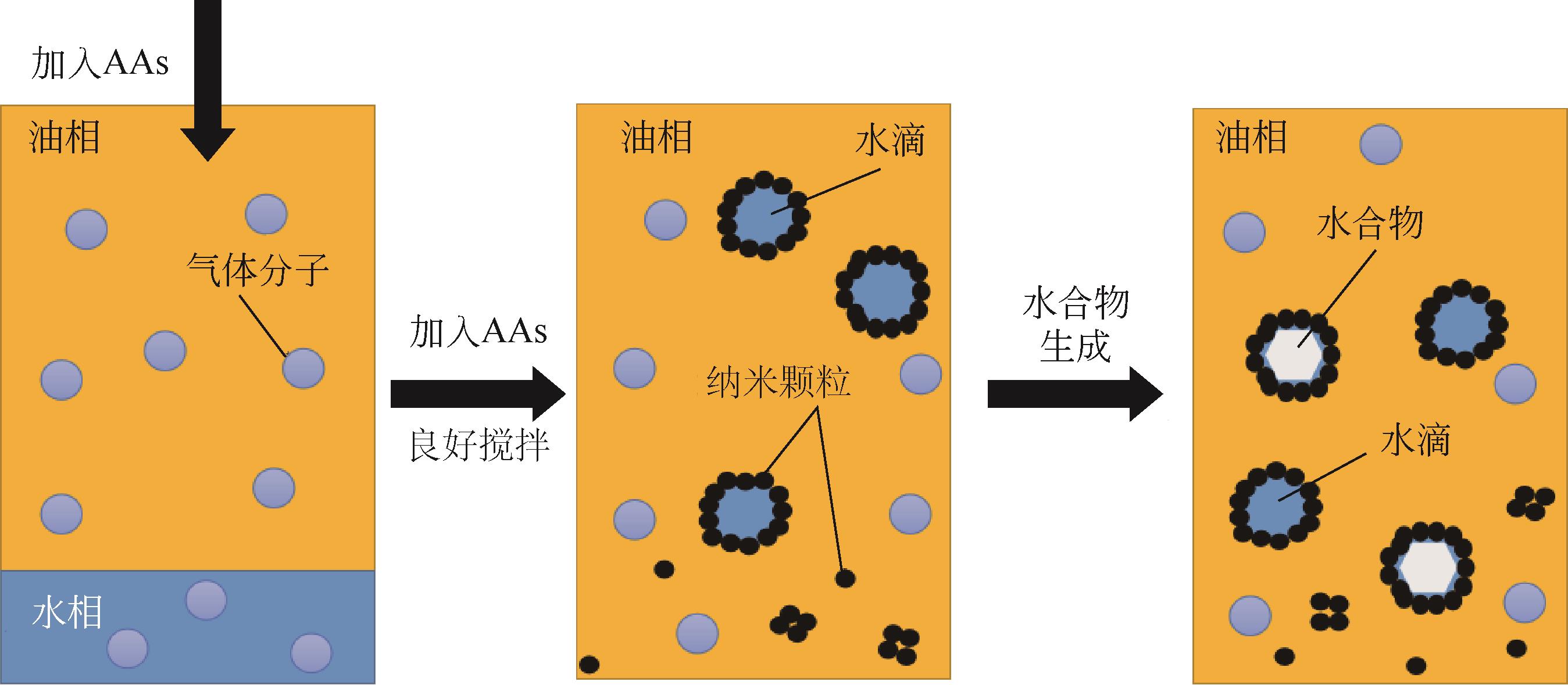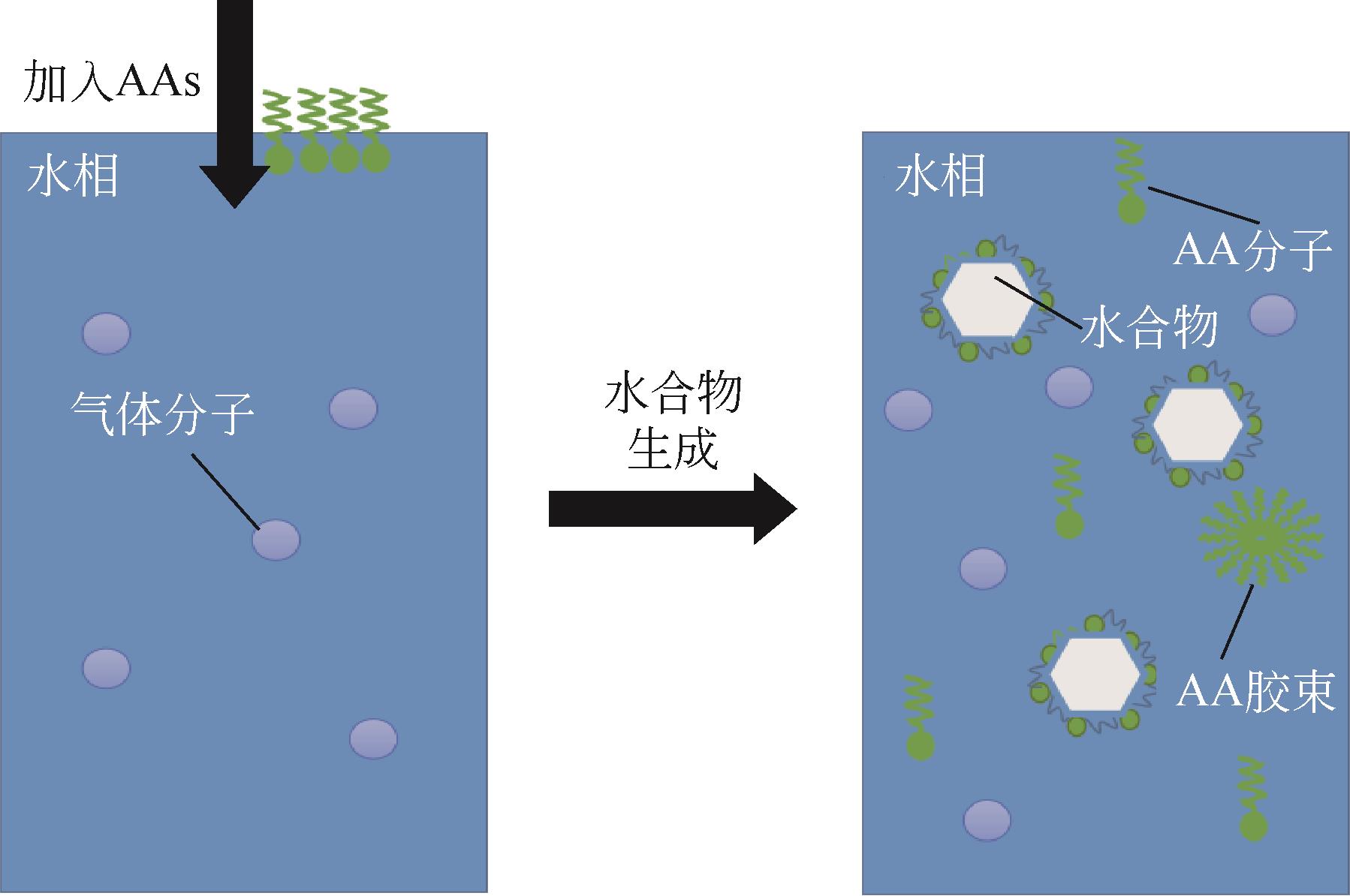Chemical Industry and Engineering Progress ›› 2023, Vol. 42 ›› Issue (9): 4587-4602.DOI: 10.16085/j.issn.1000-6613.2022-1985
• Energy processes and technology • Previous Articles Next Articles
Progress of gas hydrate anti-agglomerants
WANG Jinhang1,2,3,4,5( ), HE Yong1,2,3,4, SHI Lingli1,2,3,4, LONG Zhen1,2,3,4(
), HE Yong1,2,3,4, SHI Lingli1,2,3,4, LONG Zhen1,2,3,4( ), LIANG Deqing1,2,3,4(
), LIANG Deqing1,2,3,4( )
)
- 1.Guangzhou Institute of Energy Conversion, Chinese Academy of Sciences, Guangzhou 510640, Guangdong, China
2.Key Laboratory of Gas Hydrate, Chinese Academy of Sciences, Guangzhou 510640, Guangdong, China
3.Guangdong Provincial Key Laboratory of New and Renewable Energy Research and Development, Guangzhou 510640, Guangdong, China
4.State Key Laboratory of Natural Gas Hydrate, Beijing 100028, China
5.University of Chinese Academy of Sciences, Beijing 100049, China
-
Received:2022-10-25Revised:2023-03-05Online:2023-09-28Published:2023-09-15 -
Contact:LONG Zhen, LIANG Deqing
气体水合物阻聚剂研究进展
王谨航1,2,3,4,5( ), 何勇1,2,3,4, 史伶俐1,2,3,4, 龙臻1,2,3,4(
), 何勇1,2,3,4, 史伶俐1,2,3,4, 龙臻1,2,3,4( ), 梁德青1,2,3,4(
), 梁德青1,2,3,4( )
)
- 1.中国科学院广州能源研究所,广东 广州 510640
2.中国科学院天然气水合物重点实验室,广东 广州 510640
3.广东省新能源和可再生能源研究开发与应用重点实验室,广东 广州 510640
4.天然气水合物国家重点实验室,北京 100028
5.中国科学院大学,北京 100049
-
通讯作者:龙臻,梁德青 -
作者简介:王谨航(1999—),男,硕士研究生,研究方向为新型水合物生成抑制技术。E-mail:wangjinhang@tju.edu.cn。 -
基金资助:国家自然科学基金(51506202);广东省特支计划(2019BT02L278);广东省重点领域研发计划(2020B111101000403)
CLC Number:
Cite this article
WANG Jinhang, HE Yong, SHI Lingli, LONG Zhen, LIANG Deqing. Progress of gas hydrate anti-agglomerants[J]. Chemical Industry and Engineering Progress, 2023, 42(9): 4587-4602.
王谨航, 何勇, 史伶俐, 龙臻, 梁德青. 气体水合物阻聚剂研究进展[J]. 化工进展, 2023, 42(9): 4587-4602.
share this article
Add to citation manager EndNote|Ris|BibTeX
URL: https://hgjz.cip.com.cn/EN/10.16085/j.issn.1000-6613.2022-1985
| 16 | HUO Zhongxin, FREER E, LAMAR M, et al. Hydrate plug prevention by anti-agglomeration[J]. Chemical Engineering Science, 2001, 56(17): 4979-4991. |
| 17 | KELLAND M A, SVARTAAS T M, ØVSTHUS J, et al. Studies on some zwitteronic surfactant gas hydrate anti-agglomerants[J]. Chemical Engineering Science, 2006, 61(12): 4048-4059. |
| 18 | KELLAND M A, SVARTÅS T M, ANDERSEN L D. Gas hydrate anti-agglomerant properties of polypropoxylates and some other demulsifiers[J]. Journal of Petroleum Science and Engineering, 2009, 64(1/2/3/4): 1-10. |
| 19 | CHUA Pei Cheng, SÆBØ M, LUNDE A, et al. Dual kinetic hydrate inhibition and scale inhibition by polyaspartamides[J]. Energy & Fuels, 2011, 25(11): 5165-5172. |
| 20 | KLOMP U C. Method for inhibiting the plugging of conduits by gas hydrates: US20150126413[P]. 2015-05-07. |
| 21 | PERRIN A, MUSA O M, STEED J W. The chemistry of low dosage clathrate hydrate inhibitors[J]. Chemical Society Reviews, 2013, 42(5): 1996-2015. |
| 22 | CHUA Pei Cheng, KELLAND M A. Study of the gas hydrate anti-agglomerant performance of a series of n-alkyl-tri(n-butyl) ammonium bromides[J]. Energy & Fuels, 2013, 27(3): 1285-1292. |
| 23 | PHAN Anh, Tai BUI, ACOSTA E, et al. Molecular mechanisms responsible for hydrate anti-agglomerant performance[J]. Physical Chemistry Chemical Physics, 2016, 18(36): 24859-24871. |
| 24 | KLOMP U C. Method for inhibiting the plugging of conduits by gas hydrates: US6152993[P]. 2000-11-28. |
| 25 | KLOMP U C, KRUKA V R, REIJNHART R, et al. Method for inhibiting the plugging of conduits by gas hydrates: US5648575[P]. 1997-07-15. |
| 26 | Tai BUI, PHAN Anh, MONTEIRO D, et al. Evidence of structure-performance relation for surfactants used as anti-agglomerants for hydrate management[J]. Langmuir, 2017, 33(9): 2263-2274. |
| 27 | YORK J D, FIROOZABADI A. Alcohol cosurfactants in hydrate anti-agglomeration[J]. The Journal of Physical Chemistry B, 2008, 112(34): 10455-10465. |
| 28 | LIU Chenwei, LI Mingzhong, SRIVASTAVA V K, et al. Investigating gas hydrate formation in moderate to high water cut crude oil containing arquad and salt, using differential scanning calorimetry[J]. Energy & Fuels, 2016, 30(4): 2555-2562. |
| 29 | YORK J D, FIROOZABADI A. Effect of brine on hydrate antiagglomeration[J]. Energy & Fuels, 2009, 23(6): 2937-2946. |
| 30 | DELROISSE H, J-P TORRÉ, DICHARRY C. Effects of a quaternary ammonium salt on the growth, wettability, and agglomeration of structure II hydrate crystals[J]. Energy & Fuels, 2018, 32(12): 12277-12288. |
| 31 | DELROISSE H, J-P TORRÉ, DICHARRY C. Effect of a hydrophilic cationic surfactant on cyclopentane hydrate crystal growth at the water/cyclopentane interface[J]. Crystal Growth & Design, 2017, 17(10): 5098-5107. |
| 32 | SHI Lingli, HE Yong, LU Jingsheng, et al. Effect of dodecyl dimethyl benzyl ammonium chloride on CH4 hydrate growth and agglomeration in oil-water systems[J]. Energy, 2020, 212: 118746. |
| 33 | 孙长宇, 陈光进, 李实, 等. 双子季铵盐类防聚剂及其合成方法与抑制水合物聚积方法: CN104262184B[P]. 2016-06-08. |
| SUN Changyu, CHEN Guangjin, LI Shi, et al. Gemini quaternary ammonium salt antiagglomerant, synthesis method thereof, and method for inhibiting hydrate agglomeration: CN104262184B[P]. 2016-06-08. | |
| 34 | 王晓琴, 秦慧博, 马庆兰, 等. 基于植物提取液活性成分分析的水合物阻聚剂研制[J]. 化工进展, 2016, 35(12): 4007-4013. |
| WANG Xiaoqin, QIN Huibo, MA Qinglan, et al. Development of hydrate anti-agglomerant based on the analysis of active components of a plant extract with anti-agglomeration effect[J]. Chemical Industry and Engineering Progress, 2016, 35(12): 4007-4013. | |
| 35 | 杜娟. 低剂量抑制剂作用下水合物颗粒黏附作用及聚集机理研究[D]. 广州: 华南理工大学, 2011. |
| DU Juan. Adhesion effects and agglomeration mechanism of hydrate particles in the presence of low dosage hydrate inhibitors[D]. Guangzhou: South China University of Technology, 2011. | |
| 36 | 徐勇军, 杨晓西, 丁静, 等. 高效复合型水合物防聚剂: CN1388201A[P]. 2003-01-01. |
| 1 | SLOAN E D. Fundamental principles and applications of natural gas hydrates[J]. Nature, 2003, 426(6964): 353-359. |
| 2 | DARABOINA N, PACHITSAS S, VON SOLMS N. Experimental validation of kinetic inhibitor strength on natural gas hydrate nucleation[J]. Fuel, 2015, 139: 554-560. |
| 3 | HAMMERSCHMIDT E G. Formation of gas hydrates in natural gas transmission lines[J]. Industrial & Engineering Chemistry, 1934, 26(8): 851-855. |
| 4 | 赵轶, 朱飞越, 刁兆斌. 油气运输过程中抑制水合物生成的研究[J]. 中国石油石化, 2017(8): 86-87. |
| ZHAO Yi, ZHU Feiyue, DIAO Zhaobin. Study on inhibiting hydrate formation during oil and gas transportation[J]. China Petrochem, 2017(8): 86-87. | |
| 5 | 税碧垣. 管道天然气水合物的防治技术[J]. 油气储运, 2001, 20(5): 9-14. |
| SHUI Biyuan. The prevention and elimination of natural gas hydrates in pipeline[J]. Oil & Gas Storage and Transportation, 2001, 20(5): 9-14. | |
| 6 | 崔运磊. 气体组分及热力学抑制剂对水合物相平衡的影响[D]. 哈尔滨: 哈尔滨工程大学, 2018. |
| CUI Yunlei. The effect of gas components and thermodynamic inhibitors on hydrate phase equilibrium[D]. Harbin: Harbin Engineering University, 2018. | |
| 7 | 陈玉川, 史博会, 李文庆, 等. 水合物动力学抑制剂的作用机理研究进展[J]. 化工进展, 2018, 37(5): 1726-1743. |
| CHEN Yuchuan, SHI Bohui, LI Wenqing, et al. Progress of influence mechanism of kinetic hydrate inhibitors[J]. Chemical Industry and Engineering Progress, 2018, 37(5): 1726-1743. | |
| 8 | SUN Minwei, WANG Yan, FIROOZABADI A. Effectiveness of alcohol cosurfactants in hydrate antiagglomeration[J]. Energy & Fuels, 2012, 26(9): 5626-5632. |
| 36 | XU Yongjun, YANG Xiaoxi, DING Jing, et al. Efficient compound hydrate anti-polymerization agent: CN1388201A[P]. 2003-01-01. |
| 37 | 徐勇军, 杨晓西, 丁静, 等. 复合型水合物防聚剂[J]. 化工学报, 2004, 55(8): 1358-1364. |
| XU Yongjun, YANG Xiaoxi, DING Jing, et al. Compound hydrate anti-agglomerants[J]. Journal of Chemical Industry and Engineering (China), 2004, 55(8): 1358-1364. | |
| 38 | LIU Zaixing, LIU Weiguo, LANG Chen, et al. Effect of surfactant HLB value on methane hydrate formation in non-ionic surfactant-oil water emulsions systems[J]. Energy Procedia, 2019, 158: 5275-5280. |
| 39 | CHEN Jun, SUN Changyu, PENG Baozi, et al. Screening and compounding of gas hydrate anti-agglomerants from commercial additives through morphology observation[J]. Energy & Fuels, 2013, 27(5): 2488-2496. |
| 40 | 孙长宇, 陈光进, 闫柯乐, 等. 非离子复合型气体水合物防聚剂: CN103865505B[P]. 2016-12-07. |
| SUN Changyu, CHEN Guangjin, YAN Kele, et al. Non-ionic compound gas hydrate anti-agglomerant: CN103865505B[P]. 2016-12-07. | |
| 41 | STOPOREV A S, SEMENOV A P, MEDVEDEV V I, et al. Formation and agglomeration of gas hydrates in gas-organic liquid-water systems in a stirred reactor: Role of resins/asphaltenes/surfactants[J]. Journal of Petroleum Science and Engineering, 2019, 176: 952-961. |
| 42 | NING Fulong, GUO Dongdong, DIN S U, et al. The kinetic effects of hydrate anti-agglomerants/surfactants[J]. Fuel, 2022, 318: 123566. |
| 43 | 丁家祥. 季铵类防聚剂对油水体系内甲烷水合物生成过程影响的研究[D]. 北京: 中国科学院大学, 2018. |
| DING Jiaxiang. Study on the influence of quaternary ammonium anticoagulants on the formation process of methane hydrate in oil-water system[D]. Beijing: University of Chinese Academy of Sciences, 2018. | |
| 44 | YORK J D, FIROOZABADI A. Comparing effectiveness of rhamnolipid biosurfactant with a quaternary ammonium salt surfactant for hydrate anti-agglomeration[J]. The Journal of Physical Chemistry B, 2008, 112(3): 845-851. |
| 9 | 刘婷婷, 胡耀强, 高明星, 等. 组合型水合物抑制剂的评价及应用[J]. 石油与天然气化工, 2019, 48(5): 39-41. |
| LIU Tingting, HU Yaoqiang, GAO Mingxing, et al. Evaluation and application of a combined natural gas hydrate inhibitor[J]. Chemical Engineering of Oil & Gas, 2019, 48(5): 39-41. | |
| 10 | 闫柯乐, 孙长宇, 姜素霞, 等. 复配型水合物防聚剂性能评价实验研究[J]. 科学技术与工程, 2015, 15(31): 23-29. |
| YAN Kele, SUN Changyu, JIANG Suxia, et al. Experimental study on the performance of compound hydrate anti-agglomerant[J]. Science Technology and Engineering, 2015, 15(31): 23-29. | |
| 11 | 徐勇军, 曾亚龙, 丁静, 等. 天然气水合物防聚剂研究进展[J]. 天然气工业, 2007, 27(9): 102-104. |
| XU Yongjun, ZENG Yalong, DING Jing, et al. Progresses on researches of gas hydrate anti-agglomerates[J]. Natural Gas Industry, 2007, 27(9): 102-104. | |
| 12 | KELLAND M A. History of the development of low dosage hydrate inhibitors[J]. Energy & Fuels, 2006, 20(3): 825-847. |
| 13 | 董三宝, 田茂琳, 徐遥远, 等. 天然气水合物防聚剂研究进展[J]. 广东化工, 2021, 48(10): 82-85. |
| DONG Sanbao, TIAN Maolin, XU Yaoyuan, et al. Progress in the investigation of natural gas hydrate anti-agglomerants[J]. Guangdong Chemical Industry, 2021, 48(10): 82-85. | |
| 14 | 任悦萌, 闫柯乐. 水合物阻聚剂性能评价方法研究进展[J]. 应用化工, 2021, 50(5): 1335-1340. |
| REN Yuemeng, YAN Kele. Research progress on performance evaluation methods of hydrate anti-agglomerant[J]. Applied Chemical Industry, 2021, 50(5): 1335-1340. | |
| 15 | 闫柯乐, 孙长宇, 邹兵, 等. 激光测量技术在水合物阻聚剂性能评价中的应用[J]. 现代化工, 2015, 35(9): 176-179. |
| YAN Kele, SUN Changyu, ZOU Bing, et al. Application of laser measurement technique on the evaluation of gas hydrate anti-agglomerant[J]. Modern Chemical Industry, 2015, 35(9): 176-179. | |
| 45 | LI Xiaokai, NEGADI L, FIROOZABADI A. Anti-agglomeration in cyclopentane hydrates from bio- and co-surfactants[J]. Energy & Fuels, 2010, 24(9): 4937-4943. |
| 46 | HOU Guodong, LIANG Deqing, LI Xiaosen. Experimental study on hydrate anti-agglomeration in the presence of rhamnolipid[J]. RSC Advances, 2018, 8(69): 39511-39519. |
| 47 | SHI Lingli, HE Yong, LU Jingsheng, et al. Anti-agglomeration evaluation and Raman spectroscopic analysis on mixed biosurfactants for preventing CH4 hydrate blockage in n-octane+water systems[J]. Energy, 2021, 229: 120755. |
| 48 | DIEKER L E, AMAN Z M, GEORGE N C, et al. Micromechanical adhesion force measurements between hydrate particles in hydrocarbon oils and their modifications[J]. Energy & Fuels, 2009, 23(12): 5966-5971. |
| 49 | JOHAN M R, HAN Tan Kim, AROF A K, et al. Growth and sintering effects of hydrated polycrystalline Li2WO4 [J]. Ionics, 2010, 16(4): 323-333. |
| 50 | AMAN Z M, SLOAN E D, SUM A K, et al. Lowering of clathrate hydrate cohesive forces by surface active carboxylic acids[J]. Energy & Fuels, 2012, 26(8): 5102-5108. |
| 51 | SUN Minwei, FIROOZABADI A. New surfactant for hydrate anti-agglomeration in hydrocarbon flowlines and seabed oil capture[J]. Journal of Colloid and Interface Science, 2013, 402: 312-319. |
| 52 | SUN Minwei, FIROOZABADI A. Natural gas hydrate particles in oil-free systems with kinetic inhibition and slurry viscosity reduction[J]. Energy & Fuels, 2014, 28(3): 1890-1895. |
| 53 | ZHAO Huangjing, SUN Minwei, FIROOZABADI A. Anti-agglomeration of natural gas hydrates in liquid condensate and crude oil at constant pressure conditions[J]. Fuel, 2016, 180: 187-193. |
| 54 | DONG Sanbao, LI Mingzhong, FIROOZABADI A. Effect of salt and water cuts on hydrate anti-agglomeration in a gas condensate system at high pressure[J]. Fuel, 2017, 210: 713-720. |
| 55 | LI Rong, LI Xiaosen, CHEN Zhaoyang, et al. Anti-agglomerator of tetra-n-butyl ammonium bromide hydrate and its effect on hydrate-based CO2 capture[J]. Energies, 2018, 11(2): 399. |
| 56 | ZHAO Xin, FANG Qingchao, QIU Zhengsong, et al. Experimental investigation on hydrate anti-agglomerant for oil-free systems in the production pipe of marine natural gas hydrates[J]. Energy, 2022, 242: 122973. |
| 57 | LEE Wonhee, CHOI Youngil, KIM Yeonggyu, et al. Rheological investigation of methane hydrate formation with biodegradable emulsifiers as anti-agglomerants[J]. Journal of Petroleum Science and Engineering, 2019, 183: 106454. |
| 58 | KANG Seong-Pil, LEE Dongwon, LEE Jong-Won. Anti-agglomeration effects of biodegradable surfactants from natural sources on natural gas hydrate formation[J]. Energies, 2020, 13(5): 1107. |
| 59 | 马晓林, 舒碧芬, 郭开华, 等. 纳米磁性液体对HCFC141b气体水合物生成特性的影响[J]. 武汉理工大学学报(交通科学与工程版), 2004, 28(6): 873-875. |
| MA Xiaolin, SHU Bifen, GUO Kaihua, et al. Influence of nanometer magnetofluid on the character of HCFC-141b gas hydrate formation[J]. Journal of Wuhan University of Technology, 2004, 28(6): 873-875. | |
| 60 | SUN Zhigao, JIAO Lijun, ZHAO Zhigui, et al. Phase equilibrium conditions of semi-calthrate hydrates of (tetra-n-butyl ammonium chloride + carbon dioxide)[J]. The Journal of Chemical Thermodynamics, 2014, 75: 116-118. |
| 61 | WANG Mao, SUN Zhigao, QIU Xiaohan, et al. Hydrate dissociation equilibrium conditions for carbon dioxide+tetrahydrofuran[J]. Journal of Chemical & Engineering Data, 2017, 62(2): 812-815. |
| 62 | M-V HEUVEL, WITTEMAN R, PETERS C J. Phase behaviour of gas hydrates of carbon dioxide in the presence of tetrahydropyran, cyclobutanone, cyclohexane and methylcyclohexane[J]. Fluid Phase Equilibria, 2001, 182(1/2): 97-110. |
| 63 | 李金平, 吴疆, 梁德青, 等. 纳米流体中气体水合物生成过程的实验研究[J]. 西安交通大学学报, 2006, 40(3): 365-368. |
| LI Jinping, WU Jiang, LIANG Deqing, et al. Experimental study on formation process of gas hydrate formation in nanofluids[J]. Journal of Xi’an Jiaotong University, 2006, 40(3): 365-368. | |
| 64 | 孙慧翠, 王韧, 徐显广, 等. 亲水纳米SiO2对CH4水合物形成的影响[J]. 中国石油大学学报(自然科学版), 2018, 42: 81-87. |
| SUN Huicui, WANG Ren, XU Xianguang, et al. Effect of hydrophilic nano-SiO2 on formation of CH4 hydrate[J]. Journal of China University of Petroleum (Edition of Natural Science), 2018, 42: 81-87. | |
| 65 | 方翔宇, 宁伏龙, 欧文佳, 等. 井筒条件下疏水纳米SiO2对水合物形成的影响[J]. 中国科技论文, 2021, 16(4): 370-376. |
| FANG Xiangyu, NING Fulong, Wenjia OU, et al. Effect of hydrophobic nano-SiO2 on hydrate formation under wellbore conditions[J]. Chinese Science and Technology Papers, 2021, 16(4): 370-376. | |
| 66 | ZHANG Xianwei, GONG Jingjing, YANG Xingfu, et al. Functionalized nanoparticles for the dispersion of gas hydrates in slurry flow[J]. ACS Omega, 2019, 4(8): 13496-13508. |
| 67 | MIN Juwon, BAEK Seungjun, SOMASUNDARAN P, et al. Anti-adhesive behaviors between solid hydrate and liquid aqueous phase induced by hydrophobic silica nanoparticles[J]. Langmuir, 2016, 32(37): 9513-9522. |
| 68 | MIN Juwon, KANG Dong Woo, Yun-Ho AHN, et al. Recoverable magnetic nanoparticles as hydrate inhibitors[J]. Chemical Engineering Journal, 2020, 389: 124461. |
| 69 | SALMIN D C, ESTANGA D, KOH C A. Review of gas hydrate anti-agglomerant screening techniques[J]. Fuel, 2022, 319: 122862. |
| 70 | 辛桂振, 高永海, 苏愈发, 等. 深水测试期间复合型水合物抑制剂实验研究[J]. 海洋工程装备与技术, 2019, 6(S1): 128-132. |
| XIN Guizhen, GAO Yonghai, SU Yufa, et al. Experimental study on complex hydrate inhibitors during deep water testing[J]. Ocean Engineering Equipment and Technology, 2019, 6(S1): 128-132. | |
| 71 | CHEN Jun, WANG Yunfei, SUN Changyu, et al. Evaluation of gas hydrate anti-agglomerant based on laser measurement[J]. Energy & Fuels, 2015, 29(1): 122-129. |
| 72 | SUN Minwei, FIROOZABADI A, CHEN Guangjin, et al. Hydrate size measurements in anti-agglomeration at high watercut by new chemical formulation[J]. Energy & Fuels, 2015, 29(5): 2901-2905. |
| 73 | Yining LYU, GUAN Yintang, GUO Shudi, et al. Effects of combined sorbitan monolaurate anti-agglomerants on viscosity of water-in-oil emulsion and natural gas hydrate slurry[J]. Energies, 2017, 10(8): 1105. |
| 74 | 张学玲. 天然气水合物摇摆釜系统设计与堵塞特性实验研究[D]. 大连: 大连理工大学, 2019. |
| ZHANG Xueling. Design of rocking cell experiment system for natural gas hydrate and experimental study on its plugging behaviors[D]. Dalian: Dalian University of Technology, 2019. | |
| 75 | KELLAND M A, SVARTAAS T M, ØVSTHUS J, et al. Studies on some alkylamide surfactant gas hydrate anti-agglomerants[J]. Chemical Engineering Science, 2006, 61(13): 4290-4298. |
| 76 | KELLAND M A, GRINROΦD A, DIRDAL E G. Novel benchtop wheel loop for low dosage gas hydrate inhibitor screening: Comparison to rocking cells for a series of antiagglomerants[J]. Journal of Chemical & Engineering Data, 2015, 60(2): 252-257. |
| 77 | 王武昌, 李玉星, 樊栓狮, 等. HCFC-141b水合物浆流动特性实验[J]. 低温工程, 2010(4): 13-17. |
| WANG Wuchang, LI Yuxing, FAN Shuanshi, et al. Study on flow behaviors of HCFC-141b hydrate slurry[J]. Cryogenics, 2010(4): 13-17. | |
| 78 | SUN Changyu, CHEN Guangjin, GUO Tianmin. R12 hydrate formation kinetics based on laser light scattering technique[J]. Science in China B, 2003, 46(5): 487-494. |
| 79 | TANG Cuiping, ZHAO Xiangyong, LI Dongliang, et al. Investigation of the flow characteristics of methane hydrate slurries with low flow rates[J]. Energies, 2017, 10(1): 145. |
| 80 | JOSHI S V, GRASSO G A, LAFOND P G, et al. Experimental flowloop investigations of gas hydrate formation in high water cut systems[J]. Chemical Engineering Science, 2013, 97: 198-209. |
| 81 | AMAN Z M, DI LORENZO M, KOZIELSKI K, et al. Hydrate formation and deposition in a gas-dominant flowloop: Initial studies of the effect of velocity and subcooling[J]. Journal of Natural Gas Science and Engineering, 2016, 35: 1490-1498. |
| 82 | SAKURAI S, HOSKIN B, CHOI Joel, et al. Investigating hydrate formation rate and the viscosity of hydrate slurries in water-dominant flow: Flowloop experiments and modelling[J]. Fuel, 2021, 292: 120193. |
| 83 | 李智明. 阻垢剂或缓蚀剂存在下水合物生长和黏附作用研究[D]. 广州: 华南理工大学, 2019. |
| LI Zhiming. Study on the growth and adhesion of hydrates in the presence of scale inhibitor or corrosion inhibitor[D]. Guangzhou: South China University of Technology, 2019. | |
| 84 | 李波锋. 气相体系中水合物聚集及壁面沉积力学机制研究[D]. 东营: 中国石油大学(华东), 2019. |
| LI Bofeng. Study on mechanism of hydrate aggregation and wall deposition in gas phase system[D]. Dongying: China University of Petroleum (Huadong), 2019. | |
| 85 | AMAN Z M, DIEKER L E, ASPENES G, et al. Influence of model oil with surfactants and amphiphilic polymers on cyclopentane hydrate adhesion forces[J]. Energy & Fuels, 2010, 24(10): 5441-5445. |
| 86 | DU Juan, WANG Yanhong, LANG Xuemei, et al. Effects of polyvinyl alcohol on the adhesion force of tetrahydrofuran hydrate particles[J]. Energy & Fuels, 2011, 25(7): 3204-3211. |
| 87 | LI Mingzhong, DONG Sanbao, LI Bofeng, et al. Effects of a naturally derived surfactant on hydrate anti-agglomeration using micromechanical force measurement[J]. Journal of Industrial and Engineering Chemistry, 2018, 67: 140-147. |
| 88 | HU Sijia, KOH C A. Interfacial properties and mechanisms dominating gas hydrate cohesion and adhesion in liquid and vapor hydrocarbon phases[J]. Langmuir: the ACS Journal of Surfaces and Colloids, 2017, 33(42): 11299-11309. |
| 89 | HU Sijia, KOH C A. CH4/C2H6 gas hydrate interparticle interactions in the presence of anti-agglomerants and salinity[J]. Fuel, 2020, 269: 117208. |
| 90 | 弭永飞. 高压气相水合物壁面生长规律及黏附力学特性研究[D]. 东营: 中国石油大学(华东), 2020. |
| MI Yongfei. Study on growth and adhesion mechanics of high pressure gas hydrate on pipewall[D]. Dongying: China University of Petroleum(Huadong), 2020. | |
| 91 | BELLUCCI M A, WALSH M R, TROUT B L. Molecular dynamics analysis of anti-agglomerant surface adsorption in natural gas hydrates[J]. The Journal of Physical Chemistry C, 2018, 122(5): 2673-2683. |
| 92 | 郭秋仪. 甲烷-盐水和油-水-防聚剂体系界面性质的分子动力学模拟[D]. 大连: 大连理工大学, 2021. |
| GUO Qiuyi. Molecular dynamics simulation of the interfacial properties of methane-brine and oil-water-anti-agglomerants systems[D]. Dalian: Dalian University of Technology, 2021. | |
| 93 | MEHRABIAN H, BELLUCCI M A, WALSH M R, et al. Effect of salt on anti-agglomerant surface adsorption in natural gas hydrates[J]. The Journal of Physical Chemistry C, 2018, 122(24): 12839-12849. |
| 94 | NAULLAGE P M, BERTOLAZZO A A, MOLINERO V. How do surfactants control the agglomeration of clathrate hydrates? [J]. ACS Central Science, 2019, 5(3): 428-439. |
| 95 | FANG Bin, NING Fulong, HU Sijia, et al. The effect of surfactants on hydrate particle agglomeration in liquid hydrocarbon continuous systems: A molecular dynamics simulation study[J]. RSC Advances, 2020, 10(52): 31027-31038. |
| 96 | BERTOLAZZO A A, NAULLAGE P M, PETERS B, et al. The clathrate-water interface is oleophilic[J]. The Journal of Physical Chemistry Letters, 2018, 9(12): 3224-3231. |
| 97 | CHEN Zherui, LI Yanghui, CHEN Cong, et al. Aggregation behavior of asphalt on the natural gas hydrate surface with different surfactant coverages[J]. The Journal of Physical Chemistry C, 2021, 125(30): 16378-16390. |
| 98 | LACHANCE J W, SLOAN E D, KOH C A. Effect of hydrate formation/dissociation on emulsion stability using DSC and visual techniques[J]. Chemical Engineering Science, 2008, 63(15): 3942-3947. |
| 99 | MIN Juwon, KANG Dong Woo, LEE Wonhyeong, et al. Molecular dynamics simulations of hydrophobic nanoparticle effects on gas hydrate formation[J]. The Journal of Physical Chemistry C, 2020, 124(7): 4162-4171. |
| 100 | KIRAN B S, BHAVYA T, PRASAD P SR. Synergistic and antagonistic effects of amino acids in clathrate hydrates of greenhouse gases[J]. Chemical Engineering Journal Advances, 2021, 7:100117. |
| 101 | SEO Yutaek, SHIN Kyuchul, KIM Hyunho, et al. Preventing gas hydrate agglomeration with polymer hydrogels[J]. Energy & Fuels, 2014, 28(7): 4409-4420. |
| 102 | PARK Juwoon, KIM Hyunho, SEO Yutaek, et al. Raman spectroscopic and kinetic analysis of hydrate shell formation on hydrogel particles containing monoethylene glycol[J]. Journal of Natural Gas Science and Engineering, 2017, 42: 48-55. |
| [1] | WANG Lele, YANG Wanrong, YAO Yan, LIU Tao, HE Chuan, LIU Xiao, SU Sheng, KONG Fanhai, ZHU Canghai, XIANG Jun. Influence of spent SCR catalyst blending on the characteristics and deNO x performance for new SCR catalyst [J]. Chemical Industry and Engineering Progress, 2023, 42(S1): 489-497. |
| [2] | ZHAO Jingchao, TAN Ming. Effect of surfactants on the reduction of industrial saline wastewater by electrodialysis [J]. Chemical Industry and Engineering Progress, 2023, 42(S1): 529-535. |
| [3] | XU Zhongshuo, ZHOU Panpan, WANG Yuhui, HUANG Wei, SONG Xinshan. Advances in sulfur iron ore mediated autotrophic denitrification [J]. Chemical Industry and Engineering Progress, 2023, 42(9): 4863-4871. |
| [4] | SONG Weitao, SONG Huiping, FAN Zhenlian, FAN Biao, XUE Fangbin. Research progress of fly ash in anti-corrosion coatings [J]. Chemical Industry and Engineering Progress, 2023, 42(9): 4894-4904. |
| [5] | LI Xin, YANG Zao, ZHONG Xinru, HAN Haoxuan, ZHUANG Xuning, BAI Jianfeng, DONG Bin, XU Zuxin. Binding mechanism of Pb2+ onto humic acids from sludge hyper-thermophilic composting [J]. Chemical Industry and Engineering Progress, 2023, 42(9): 4957-4966. |
| [6] | LI You, WU Yue, ZHONG Yu, LIN Qixuan, REN Junli. Pretreatment of wheat straw with acidic molten salt hydrate for xylose production and its effect on enzymatic hydrolysis efficiency [J]. Chemical Industry and Engineering Progress, 2023, 42(9): 4974-4983. |
| [7] | YIN Xinyu, PI Pihui, WEN Xiufang, QIAN Yu. Application of special wettability materials for anti-hydrate-nucleation and anti-hydrate-adhesion in oil and gas pipelines [J]. Chemical Industry and Engineering Progress, 2023, 42(8): 4076-4092. |
| [8] | YANG Han, ZHANG Yibo, LI Qi, ZHANG Jun, TAO Ying, YANG Quanhong. Practical carbon anodes for sodium-ion batteries: progress and challenge [J]. Chemical Industry and Engineering Progress, 2023, 42(8): 4029-4042. |
| [9] | WU Ya, ZHAO Dan, FANG Rongmiao, LI Jingyao, CHANG Nana, DU Chunbao, WANG Wenzhen, SHI Jun. Research progress on highly efficient demulsifiers for complex crude oil emulsions and their applications [J]. Chemical Industry and Engineering Progress, 2023, 42(8): 4398-4413. |
| [10] | OUYANG Sufang, ZHOU Daowei, HUANG Wei, JIA Feng. Research progress on novel anti-migration rubber antioxidants [J]. Chemical Industry and Engineering Progress, 2023, 42(7): 3708-3719. |
| [11] | ZHANG Kai, LYU Qiunan, LI Gang, LI Xiaosen, MO Jiamei. Morphology and occurrence characteristics of methane hydrates in the mud of the South China Sea [J]. Chemical Industry and Engineering Progress, 2023, 42(7): 3865-3874. |
| [12] | YANG Yang, SUN Zhigao, LI Cuimin, LI Juan, HUANG Haifeng. Promotion on the formation of HCFC-141b hydrate under static conditions by surfactant OP-13 [J]. Chemical Industry and Engineering Progress, 2023, 42(6): 2854-2859. |
| [13] | WANG Xue, XU Qiyong, ZHANG Chao. Hydrothermal carbonization of the lignocellulosic biomass and application of the hydro-char [J]. Chemical Industry and Engineering Progress, 2023, 42(5): 2536-2545. |
| [14] | LIU Jia, LIANG Deqing, LI Junhui, LIN Decai, WU Siting, LU Fuqin. A review of flow assurance studies on hydrate slurry in oil-water system [J]. Chemical Industry and Engineering Progress, 2023, 42(4): 1739-1759. |
| [15] | SI Yinfang, HU Yujie, ZHANG Fan, DONG Hao, SHE Yuehui. Biosynthesis of zinc oxide nanoparticles and its application to antibacterial [J]. Chemical Industry and Engineering Progress, 2023, 42(4): 2013-2023. |
| Viewed | ||||||
|
Full text |
|
|||||
|
Abstract |
|
|||||
